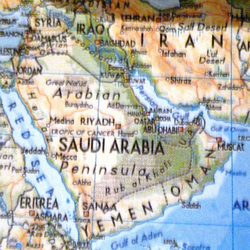
Try this:
“We’re leaving behind a sovereign, stable, and self-reliant Iraq, with a representative government that was elected by its people.”
That’s what President Obama said in December of 2011 as he announced that troops had been withdrawn and the U.S. war in Iraq was over.
| | This statement was every bit as wrong, foolish and audacious as Bush’s banner. The only difference is that when Bush’s error became obvious, he kept forces in Iraq in an attempt to get the job done. Obama withdrew, and now that his error is obvious and Iraq is in real danger of become a staging ground for international terrorism of a sort not previously seen, he has announced there will be no ground troops and that he is weighing other options. Obama said Iraq has political problems, noting that the U.S. has made huge sacrifices (about 5,000 casualties, for starters) in an effort to give Iraq a representative democracy, but that the leaders of that country have been unable to overcome sectarian differences. Until that is corrected, the U.S. won’t be able to fix things with “short-term military action.” So, what’s the plan? While the president is demanding a full-scale solution to the challenges of representative government, Iraq is in real danger of losing the imperfect government it has and gaining one that would be a dangerous threat to the world. This is kind of like standing by a burning house and arguing over the family squabbles of the people who live there. Someone needs to turn on a hose before all is lost. In much of Iraq today, these are the rules: Women must remain indoors unless it is absolutely necessary for them to venture out, and then they must be covered from head to toe. Anyone caught stealing will have a limb amputated. Other criminals face possible death by crucifixion (except, of course, for the criminals in power). Opposition to the ruling party will not be tolerated. This extreme version of sharia law sounds familiar to us because it once was in effect when the Taliban ruled Afghanistan. Only this time, the rules are being imposed by the Islamic State of Iraq and Syria, or ISIS. As Middle East researcher Charlie Cooper writes in The Telegram, this is not an affiliate of al Qaida, it is far more dangerous, “more relevant and influential than al-Qaeda. It is driven by a dogma that puts it far beyond any kind of engagement or dialogue. As one Iraq official put it this week, ‘we are fighting devils and not ordinary people.’” And they’re doing it without much help. Obama said his decision as to what exactly to do, “is not going to happen overnight.” I’ll admit there are no easy answers to this crisis, and it is being complicated further by the apparent willingness of Iran to intervene on Iraq’s behalf. But the situation is so difficult largely because the Obama administration chose to withdraw troops too early. Writing for Slate.com, Reihan Salam argues the United States never should have gone to war in Iraq in the first place, and that it never should have withdrawn until Iraq truly was able to defend and sustain itself. This notion, he said, “is hard to comprehend for many people.” If, as the president said, Iraq has been unable to pull together a viable government, he needs to explain why, nearly three years ago, he said they were “sovereign, stable and self-reliant.” Then he needs to explain how he is going to ensure that the blood of brave American men and women was not spilt there for so many years in vain. Clearly, things are the same now as they were in 2003. The mission has not been accomplished. |

 RSS Feed
RSS Feed

